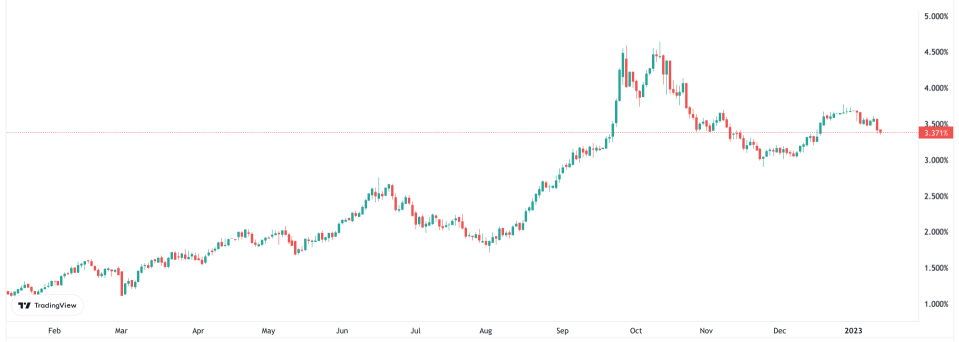Bank of England to hike interest rates to lower peak but still to financial crisis high

The Bank of England will lift interest rates to a much lower peak than expected just a matter of months ago, but is still set to send them to their steepest level since the financial crisis, City traders suspect.
Markets reckon borrowing costs will peak at below 4.5 per cent, meaning investors think the Bank is nearing the end of its aggressive rate hike cycle to tame multi-decade high inflation.
The move is a huge climb down from early November, when traders predicted governor Andrew Bailey and the rest of the monetary policy committee (MPC) would kick borrowing costs to more than six per cent to contain the financial market turmoil sparked by Liz Truss’s premiership.
She and her first chancellor, Kwasi Kwarteng, rocked international investors by launching £45bn of unfunded tax cuts at their mini-budget in September, putting Britain’s finances on an unsustainable path.
Just weeks after the announcements, the pound sank to its lowest level ever against the US dollar and UK debt costs hit their highest level in two decades.
Traders demanded a better return on UK assets – such as gilts – to swallow a sharp rise in government borrowing to pay for Truss’s tax cuts. As a result, bond prices collapsed, sending yields sharply higher. The pair move inversely.
That sell-off forced pension funds using liability driven investment vehicles to stump up cash to pay off lenders, generating a fire sale dynamic in the gilt market.
The Bank propped up the market with an up to £65bn emergency bond buying package. It did not use anywhere near the entire amount available, but signalling it would prop up the bond market shored up investor confidence, bringing yields back down quickly.
Yield on 10-year gilt has tumbled

The financial market chaos ultimately forced Truss to sack Kwarteng. She quit as the shortest serving prime minister ever in October.
Since then, now-Prime Minister Rishi Sunak and Chancellor Jeremy Hunt have rebalanced the public finances with £55bn worth of tax rises and spending cuts.
While that has assured investors of the UK’s borrowing credibility, it has raised fears the country’s recession will be longer than necessary.

Experts reckon Britain has slipped into the early stages of a slump that could last anywhere between one and two years.
That slowdown should naturally bring down inflation by sucking demand out of the economy, leading Gabriella Dickens, senior UK economist at Pantheon Macroeconomics, to claim “the MPC does not need to raise Bank Rate above four per cent this year”.
Bailey and co have rushed to tame inflation, running at a 40-year high of 10.7 per cent, with nine successive rate hikes, taking them to 3.5 per cent.
The MPC is forecast to tighten finance conditions a further 50 basis points on 2 February.